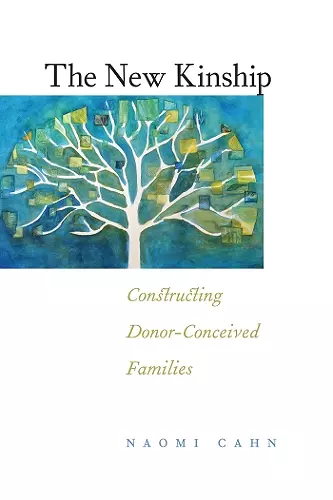The New Kinship
Constructing Donor-Conceived Families
Format:Hardback
Publisher:New York University Press
Published:7th Jan '13
Currently unavailable, and unfortunately no date known when it will be back

No federal law in the United States requires that egg or sperm donors or recipients exchange any information with the offspring that result from the donation. Donors typically enter into contracts with fertility clinics or sperm banks which promise them anonymity. The parents may know the
donor’s hair color, height, IQ, college, and profession; they may even have heard the donor’s voice. But they don’t know the donor’s name, medical history, or other information that might play a key role in a child’s development. And, until recently, donor-conceived offspring typically didn’t know that one of their biological parents was a donor. But the secrecy surrounding the use of donor eggs and sperm is changing. And as it does, increasing numbers of parents and donor-conceived offspring are searching for others who share the same biological heritage. When donors, recipients, and “donor kids” find each other, they create new forms of families that exist outside of the law.
The New Kinship details how families are made and how bonds are created between families in the brave new world of reproductive technology. Naomi Cahn, a nationally-recognized expert on reproductive technology and the law, shows how these new kinship bonds dramatically exemplify the ongoing cultural change in how we think about family. The issues Cahn explores in this book will resonate with anyone—and everyone—who has struggled with questions of how to define themselves in connection with their own biological, legal, or social families.
Donor-conceived families are transforming the way we think about family life, and Cahn's The New Kinship carefully explores questions--especially legal questions--unforeseen by the medical practitioners who first advanced in vitro fertilization (IVF) and later the standard practice to freeze donor sperm, extract donor eggs, and implant embryos into genetically unrelated women....Cahn offers compelling reasons why regulatory oversight at the federal and international levels is inadequate and how it could be improved. Her eye-popping evidence on the limited genetic testing conducted on donor gametes and on how reducing the number of children born from a single donor would minimize disease transmission are just a few examples she provides. -- Rosanna Hertz * Gender & Society *
The New Kinship is fascinating, provocative, insightful, and important. I should add that I thoroughly enjoyed reading it. -- Adam Pertman,Executive Director of the Donaldson Adoption Institute and author of Adoption Nation
The New Kinshipis an excellent introductory text for anyone interested in the intersection of gamete donation, family, and the law. * Ethics & Medicine *
"The New Kinship makes a major contribution to the literature of reproductive technologies by telling stories from the kids perspectives to argue for changes in legal regulation.It offers us new language to describe these new family relationships, and provocatively calls call for increased state regulation of the donor world.Both radical and traditional, Cahns book is a rich mix of scholarly research and real life stories of donor-conceived parents, kids, and half-siblings.A comprehensive and empathetic view of too-often overlooked donor-conceived families.At once accessible and scholarly, it makes a clear call for increased federal regulation of donor-conceived families.
-- Martha Ertman,Carole & Hanan Sibel Research Professor of Law, University of MarylandThe New Kinship turns the traditional notion of 'family' on its head. Naomi Cahn reinforces the importance of family while challenging a normatively entrenched, but inaccurate account of what makes up the modern family. As she wisely puts forth, families are more than biological connections. Rather, the heterosexual, two-parent model no longer accurately captures or defines parentage. Equally, kinship is far more complex than blood relationships; donor-conceived family communities remind us how much the law is far behind in providing an accurate linguistic, theoretical, and doctrinal account of new kinship models. Cahn brilliantly begins to fill this gap. The New Kinship: Donor Conceived Family Communities is a timely tour de force about the 'donor world' and the people who inhabit it. -- Michele Bratcher Goodwin,Everett Fraser Professor of Law & Professor of Medicine and Public Health, University of Minnesota
The book provides a good source for readers who are interested in socio-legal aspects of donor conception, and in particular debates around the donor-conceived child's 'right-to-know'. It also provides good insights about newly emerging donor kin networks. * New Genetics and Society *
ISBN: 9780814772034
Dimensions: unknown
Weight: 522g
250 pages